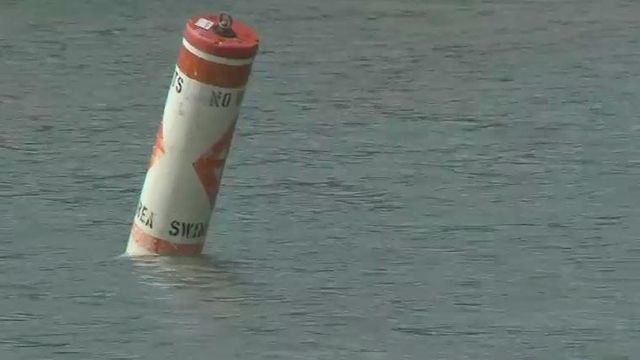Go together, check warnings to reduce risks of summer lake swimming
The Triangle area has a variety of splash pads, pools and lakes. Those trips, though, can come with some danger.
Posted — UpdatedIt has been a hot and humid summer with few breaks in the heat, but the season offers plenty of ways to cool off.
The Triangle area has a variety of splash pads, pools and lakes. Those trips, though, can come with some danger.
There are always risks when children go swimming, but pools generally have lifeguards. The water is also clear, so swimmers are more visible.
Before you jump into a lake, though, there are steps you can take to reduce the risks of drowning.
When you or your children go for a dip in a lake, Cleveland Clinic's Dr. Tom Waters says never go it alone.
"The key thing is, when swimming, whether it's in a home pool, a quarry or the lake, is to make sure you are well supervised; never swim alone," Water said. "No one ever thinks it's going to happen to them, so just minimize risk-taking. Swim safely; make sure you're with friends."
Waters says that, unfortunately, emergency departments see an increase in drowning incidents during the summer. According to the Center for Disease Control and Prevention, the U.S. averaged about 10 deaths per day from accidental drowning events over the past decade.
More than half of non-fatal drowning injuries treated in emergency departments require further hospitalization.
Non-fatal drowning injuries can result in severe brain damage and long term disabilities, such as memory problems, learning disabilities or permanent loss of basic functioning.
In any body of water, remember to look for posted warnings.
"Adhere to warnings," Waters said. "If there's a rip current warning, don't think that, you know, you're stronger than that and you should go out. And if there's water quality warnings, you need to pay attention to those because you can get sick if you ignore those and go out in the water."
Even at a pool with lifeguards, parents need to keep an eye on their kids. Lakes, though, often don't have lifeguards. So, swim only in designated swimming areas of lakes.
Don't let your children go beyond the marked swimming area, and especially for young children, have them wear a bright, colorful inflatable arm band or something to make them more visible.
This summer, there have been stories of harmful bacteria in some lakes. The U.S. Environmental Protection Agency has resources available where you can check whether the bacteria levels are monitored at your local beach.
You can also check for information available through your local health department.
• Credits
Copyright 2024 by Capitol Broadcasting Company. All rights reserved. This material may not be published, broadcast, rewritten or redistributed.





